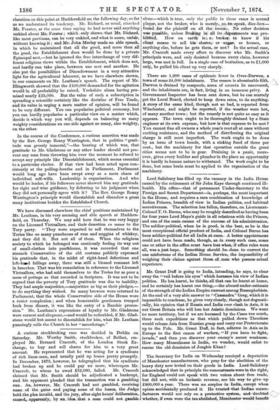A curious stockbroking case was decided in Dublin on Saturday.
Mr. Westby Smith, stockbroker, of Belfast, em- ployed Mr. Bernard Cracroft, of the London Stock Ex- change, to buy and sell shares for him to a very great amount. He represented that he was acting for a syndicate of rich linen-men, and usually paid up losses pretty promptly. In December, 1873, however, he telegraphed that his syndicate had broken up and he could pay no more, whereupon Mr. Cracroft, to whom he owed £32,000, failed. Mr. Cracroft claimed that Mr. Smith should be adjudicated a bankrupt, and his opponent pleaded that the transaction was a gambling one. As,„ however, Mr. Cracroft had not gambled, receiving none of the gains and paying none of the losses, the Judge hekl-_the, plea invalid, and the jury, after eight hours' deliberation, caused,, apparently, by an idea-that a man could not gamble- alone—which is true, only the public in these cases is second player; not the broker, who is merely, so-to-speak, dice-box- found for the plaintiff on all the issues: No other decision was possible, unless Broking in all its departments was pro- hibited. How on earth is., a broker, to know if his clieat means to sell his shares,- or - sugar, or houses, or anything else, before he gets them, or not? In the actual case, Mr. Cracroft made every effort to discover who Mr. Smith's principals were, and only desisted because every claim, however large, was met in full. lrn a single case of hesitation, as to £1,00( only, he pulled his client up very sharply.


































 Previous page
Previous page